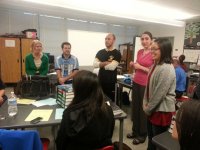Stepping Out of Traditional Teacher Preparation Programs
Your content has been saved!
Go to My Saved Content."The inspiration behind the residency model is that teacher candidates learn on the job, similar to the way a master artisan would have learned her craft." -- Dr. Annamarie Francois, Director, UCLA Center X Teacher Education Program
In 2010, the Teacher Education Program at UCLA Center X launched the first cohort of student teachers in the UCLA IMPACT program, an innovative apprenticeship model partnering aspiring teacher residents and accomplished mentor teachers together in teaching and reflective practice. Like similar teacher residency programs across the country, IMPACT's clinical model is sometimes compared to medical residency programs.
And why not? Why shouldn't we expect our new teachers to be prepared to teach students as a result of a year-long authentic experience teaching in a class while supported, guided and mentored by our best classroom educators?
Teacher residency programs emphasize how teacher residents learn from their field experience with their accomplished mentor teachers and provide the authentic experience needed to develop strong teacher identities focused on student learning. By stepping out of the traditional teacher preparation model, teacher residencies are cultivating a new generation of teachers whose professional identities are rooted in authentic collaboration, reciprocal feedback, and transformative partnerships across all levels of the school community.
Authentic Collaboration
"I really got the teacher experience. I wasn't just in the classroom half-way in the year, kind of thrown in there. I started, the kids saw me as their teacher right away." -- Jeraldy Vega, UCLA IMPACT Teacher Resident, class of 2012
Unlike more traditional teacher preparation models where learning is focused on telling student teachers how to teach, teacher residencies believe aspiring teacher residents and accomplished mentor teachers are collaborative partners in improving teaching and learning. Teacher residencies value and honor the experiences new and experienced teachers bring to the classroom and provide them with opportunities to learn and grow together through:
- Opportunities to learn and share practices side-by-side with their mentor teacher both in the classroom and in professional learning settings
- Shared practice in using high-leverage, research-based practices focused on student discourse and content meaning-making
- Creation of a classroom ecology that values student voice and classroom routines necessary in a democratic and socially just learning environment
- A gradual release model of instruction collaborated and agreed upon by the teacher residents, mentor teacher, and university faculty advisors that allows flexibility in meeting the needs of teacher residents and students in the classroom
Reciprocal Feedback
"Through reflection and one-on-one with your mentor and your advisor, you're able to hone in on your craft and really perfect what you're doing." -- Evan Spellman, UCLA IMPACT teacher resident, class of 2013
In teacher residency programs, learning is based on reciprocal feedback. All stakeholders in the program- university, schools, community partners, teacher residents and accomplished mentors participate in reciprocal feedback in order to improve the overall learning of teacher residents and subsequently, students in the classroom.
Teacher residents:
- Understand that teaching is a process of learning from trying and reflecting
- Develop a teacher identity integrating social justice issues, the needs of their students, and instruction based on deep content knowledge
- Grow in their resourcefulness and ability to be problem-solvers in the classroom through Cognitive Coaching conversations with their mentor teachers
Mentor teachers:
- Reflect and grow their own classroom practice as they learn from observing and supporting their teacher residents
- Grow in their resourcefulness and ability to be problem-solvers as mentors and classroom teachers through Cognitive Coaching conversations with fellow mentors and mentor support coaches
The university and community partners:
- Refine and respond to the changing needs of teacher apprentices and mentors
- Create stronger collaborative partnerships based on learning from the data collected in the field
Transformative Partnerships
"This year we hired two IMPACT students from UCLA. Instantly they have built trust with the kids. In doing that the students are willing to work harder." -- Ed Colacion, Principal, Young Oak Kim Academy, Los Angeles Unified School District
Ultimately, teacher residency programs aim to impact teaching across school communities by creating transformative partnerships of learning. Increased time in the field for teacher residents requires stronger school and community partnerships with the university, collaborating around a similar vision of what accomplished teaching looks like in order to best model that vision for these aspiring teachers. Therefore, these collaborative and transformative partnerships inspire a sharing of practice.
Schools begin incorporating high-leverage practices demonstrated by teacher residents and teacher residents engage in the community partnering established by the schools. Rather than just a "guest" on the school's campus, these transformative partnerships allow teacher residents to be:
- An integrated member of the school community participating in the various workings of the school
- An engaged educator around parent and community partnerships
What's Next for Teacher Education?
"Having two teachers is really great because it's like having two supports at one time." -- Seventh Grade Student, Young Oak Kim Academy, Los Angeles Unified School District
The teacher residency model is allowing teacher preparation programs to continually learn and refine our practice. By integrating data, research, and evaluation into our practice we are able to more effectively respond to the changing nature of teacher preparation in the country. In the end, teacher residencies will hopefully provide an opportunity not only for new teachers to begin their careers with, as Linda Darling-Hammond states, "the confidence and competence" to support all students to learn.
What's been your experience in your teacher preparation program? How might the UTR model be more innovative or less innovative than your experience? Please respond in the comment section below.
